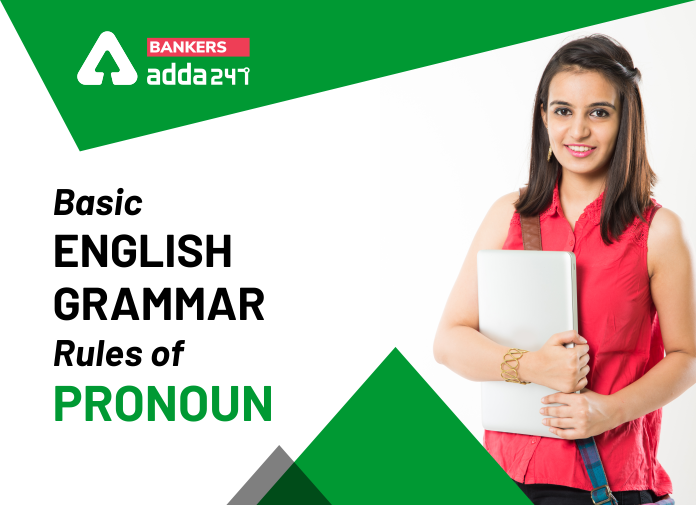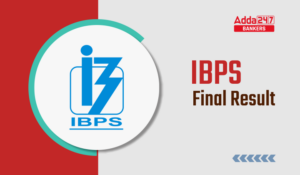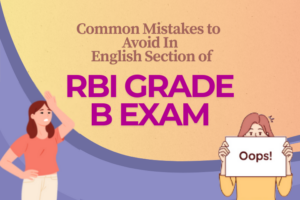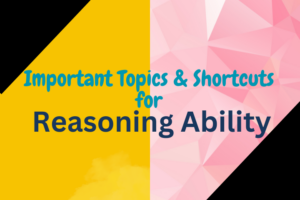Table of Contents
Candidates who are banking aspirants must be knowing the importance of English Language section. It can fetch you some very good marks if attempted carefully and with accuracy. Especially Grammar is an important section as it forms majority of the questions that are asked in the examination. In this article, we will be covering one of the most important topic of English grammar that is Pronoun.
Also read,
- Basics Rules of Noun
- Basic Rules of Verb
- Basic Rules of Subject-Verb Agreement
- Basic Rules of Conditionals
Rules Of Pronoun
☞1. A personal pronoun works in place of a noun, the number, gender and person of the pronoun must be according to the noun only.
Ex.- Sita loves his husband. (Incorrect)
Sita loves her husband. (Correct)
☞2. When there are two or more singular nouns are joined by ‘AND’ the Pronoun for them always in the plural number.
Ex.- Rohan and RAM have lost his books. (Incorrect)
Rohan and Ram have lost their books. (Correct)
☞3. If two or more singular nouns joined by ‘AND’ are preceded by ‘EACH’ and ‘EVERY’ the pronoun must be singular.
Ex.- Each of Rohan and Sohan has done his work.
☞4. If a singular nouns and a plural noun are combined by ‘OR’, ‘EITHER’ OR ‘NEITHER’ NOR the singular noun usually comes first in the sentence and the pronoun must be in the plural number.
Ex.- Either the Team manager or his subordinates failed in their duty in sending the official message.
☞5. When two or more singular nouns are joined by Either OR, neither nor the pronouns is always in the singular
Ex.- Ram or Mohan should invest his money in some business.
Also Read,
| How to Master Reading Comprehension to Score Maximum Marks? | Importance of Spoken English and How to Improve it? | SBI PO Prelims Study Plan 2020 |
☞6. Either or neither are always used in relation with two things or two persons for more than two ‘ANY’, or ‘NONE’ must be used.
Ex.- Either of the two girls can pay for it.
Neither of the two brothers has been selected.
☞7. If in a sentence ‘one’ is used as the subject all the pronouns in the sentence must be changed into ‘one’ or one’s and not his, her or him.
Ex.-One should always keep one’s promise.
☞8. If any pronoun functions as the complement of the verb ‘To be’, it is always in the nominative case.
Ex.- It is me who have to go. (Incorrect)
It is I who have to go. (Correct)
☞9. If there is any pronoun that functions as an object to a verb or a preposition, it is in the objective case.
Ex.- It is for she to consider. (Incorrect)
It is for her to consider. (Correct)
☞10. When two singular nouns are joined by AND denote the same person or thing the pronoun used for them must be singular in number. When the article ‘THE’ is placed before the first Noun.
Ex.- The accounts intern and treasures should be careful in his work of keeping accounts.
☞11. If a personal pronoun is connected by a conjunction with some other word in the objective case, it must be in the objective or accusative case.
Ex.- These shoes are for you and me. (not I)
☞12. A pronoun must be used in the objective case in a sentence beginning with Let.
Ex.- Let her go to her office
☞13. While someone is confessing a fault (or expressing a negative idea) the sequence of the personal pronouns should be as follows:
I, you and he are in the wrong and will be punished. [First person first,second person next and third person last]
Also read,
- How to Increase Calculation Speed to Crack Bank Exams?
- English Grammar Rules that Can Get You Confused
☞14. While someone is expressing a positive idea or praise, the sequence of the personal pronouns should be as follows:
You, He and I will get an award for the good work we have done.[Second person (2), third person(3), and first person (1)]
☞15. After the usage of words like ‘BUT’, ‘EXCEPT’, ‘BETWEEN’ and ‘LET’ the pronoun is used in objective case where as after such as in’ the subjective case
Ex.- Everyone danced but I. (Incorrect)
Everyone danced but me. (Correct)
☞16.When ‘Some’ is used in affirmative sentences to express quantity or degree.‘Any’ is used in Negative or interrogative sentences.
Ex.- I shall buy some mangoes.
I shall not buy any mangoes.
☞17. Enjoy, apply, resign, acquit, drive, exert, avail, pride, absent, drink, oversleep, overreach, Revenge, present etc. when used as transitive verbs, always take a reflexive pronoun after them.
Ex.- He absented from the class. (Incorrect)
He absented himself from the class. (Corrected)
☞18. When a pronoun stands for a collective noun, it must be in the singular number and in the neuter gender ifthe collective noun is viewed as a whole-
Ex.- The Jury gave its verdict.
The Jury were divided in their opinions.
☞19. Words like Each other is used about two persons.
Ex.- The two sisters disliked each other.
(b) When words like One another is used about more than two-
Ex.- Good girls do not quarrel with one another.
Also Read,
| Upcoming Bank Exams 2020 | Government Jobs for Graduates 2020 | Consumer Price Index: Definition, Types, Measurement |
☞20. The pronouns like who, whom, whose are generally used for persons
Who – Nominative case
Whom – Objective case
Whose – Possessive case
Ex.- Sita is the student who got an award.
☞21. When we use ‘WHICH’ for infants, small animals and objects.
Ex.- This is the pen which was lost in the theater.
(b) When selection is expressed in the statement.
Ex.- Which of these radios sets do you want to purchase?
(c) When we want to refer to a sentence
Ex.- She was said to be drunk, which was not true.
☞22. We use ‘THAT’ For persons, lifeless things and small animals in the singular or in the plural number.
Ex.- This is the boy that failed in the exam.
Click Here to Register for Bank Exams 2020 Preparation Material
Practice With,



 IBPS Final Result 2025 Coming Out Tomorr...
IBPS Final Result 2025 Coming Out Tomorr...
 Simple Tips to Avoid Common Mistakes In ...
Simple Tips to Avoid Common Mistakes In ...
 Important Topics & Shortcuts for IDB...
Important Topics & Shortcuts for IDB...


